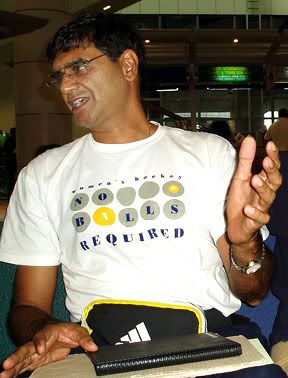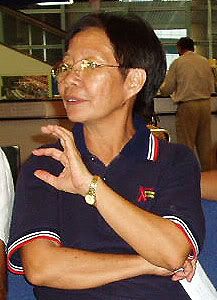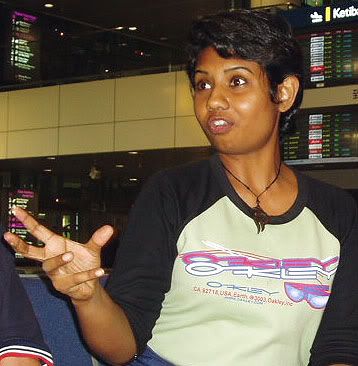Report From Mission 2 (19 - 26 January 2005)

Dr. Surinder Singh
Coordinator: Francis Xavier (KOMAS)
Team Members: Matron Lee Wan, Dr. Premela Naidu, Dr. Surinder Singh
19 Jan 2005
The team departed KLIA at 1115hrs (GMT +8) and arrived in Medan at 1105hrs (GMT +7). We got in touch with our local KSKBA contact, Inche Achmad Sofyan, who sent two people from his team in a ‘mobil’ (an MPV). Inche Yom Alizar, an airport customs officer, was instrumental in assisting us with contacting them.
Our arrival at the Posko (‘aid station’) was welcomed with black Sumateran coffee. At 1330hrs we settled into lunch and absorbed latest updates on the situation in Aceh. We also found out that this aid station is managed by a group of volunteers representing the interests of farmers and fishermen affected by the earthquake and tsunami.
Immediately after lunch we started cataloging and packing medication, using the provided zip-lock bags as well as the medicine containers. We would recommend for all future missions that all medicine should be pre-packaged and prepared for immediate dispensing.
We received some bad news – the Langsa roads leading to Aceh were flooded with four feet of water, as were all other roads on the east coast that linked Aceh; while the links at the west coast after Meulaboh were destroyed by the tsunami. It was then decided that we would travel to Meulaboh instead.

Matron Lee Wan
At 2100hrs packing was completed. All supplies, food and medication were piled ino a 3-tonne truck. We had dinner and watched some tv. Local stations still carried news on the tsunami and the quake. The tagline on Metro TV read, ‘Badai Pasti Berlalu’ (‘The Tragedy Will Surely Pass’).
We left at 2330hrs and reached the Desa Langgung aid station (in the outskirts of Meulaboh) after a grueling 22-hr journey.
20 Jan 2005
We were greeted by the Ketua Kampung (the village leader) - Inche Hussein Air Kechik, youth leader – Ubcge Yusran, abd another village elder – Inche Kudus. We were invited to stay at the youth leader’s residence throughout the duration of our stay. It was very comfortable considering the circumstances.
An interesting note: Males are refered to as Bapa (‘Father’), and females, Ibu (‘Mother’).
21 Jan 2005
Waking up to a desolation and bleakness was depressing. We had a walkabout in the area – everything in sight was destroyed, trees uprooted, houses upturned and flattened, poles uprooted and snapped into two. The beach and paddy fields were swallowed by the sea, washing away an entire kilometer of land. Debris and flies was a repetitive scene throughout.

Mr. Francis Xavier
Everyone was at the mosque for prayers as today was a Friday, as well as the celebratory Hari Raya Al-Had. Thus, We started clinical operations at 1030hrs and stopped at 1200hrs for the Friday prayers and resumed at 1400hrs. Until 1700hrs, we saw a total of 107 patients.
In our hours of rest we were taken out to visit the outlying areas. We noted shelters where people lived in very deprived conditions. It was very sobering. Everything they had was either washed off by the waves or damaged. They were entirely dependant on external aid.
22 Jan 2005
We saw patients in Bapa Nazrun’s house in the morning, and headed out to the aid station later in the day. After our clinical operations we traveled to the Meulaboh town.
The Accident & Emergency at the Meulaboh hospital was manned by volunteers from Jogjakarta, and we were told that we could have a look-see. We observed that the hospital was spared by the tsunami and as wholly intact. The condition was clean but lacking in facilities. It appeared to also be assisted by foreign doctors – paediatric ward had Belgium doctors, Operating Theatres were manged by Singaporeans and Americans.
Inche Unggul Sudrajat, a paramedic volunteer from Jakarta and a Ham set enthusiast, invited us to a briefing which was held every evening and attended by various aid agencies, NGOs, and the local authorities.

Dr. Premela
At the briefing, we volunteered our services to a Dr. Harris. The hospital apparently needed nurses, physicians and GPs urgently for effective and efficient ward operations.
23 Jan 2005
We saw patients at Yusran’s house in the morning. We later saw 174 patients at an outlying aid station during the day.
24 Jan 2005
We traveled back to Medan, reaching at 2200hrs. Tomorrow would be an off-day, and we would leave for home on 26 Jan 2005.
Conclusion and some thoughts
The mission was frought with hitches mainly due to the destroyed communications link and infrastructure. The scale of this disaster is apparent, and has called the attention of bigger bodies – what is our role as an NGO? We should contemplate on this. At the briefing two things emerged – 1. we should register with the local authorities, 2. we should consider getting involved with UNICEF, as it will be the coordinating body with local organizations and political clouts to move things, even though we NGOs work mostly at the ground level.
The relief mission is slowly phasing out for the other two phases of rehabilitation and reconstruction. It will be a very long phase but there is an ongoing need for supplies and aid to rebuild the infrastructure and communication links here in the future.


<< Home